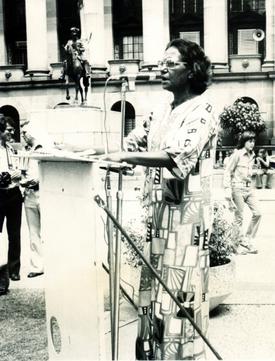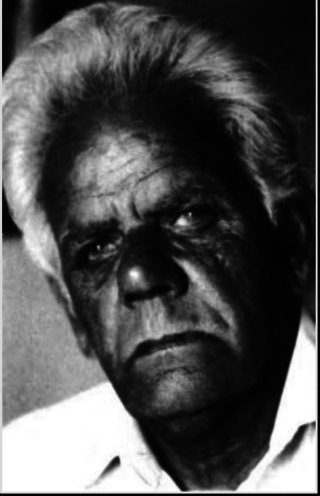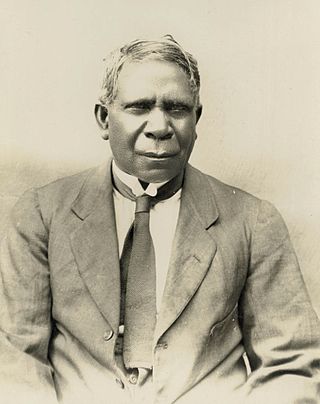Related Research Articles

The Noongar are Aboriginal Australian people who live in the south-west corner of Western Australia, from Geraldton on the west coast to Esperance on the south coast. There are 14 different groups in the Noongar cultural bloc: Amangu, Ballardong, Yued, Kaneang, Koreng, Mineng, Njakinjaki, Njunga, Pibelmen, Pindjarup, Wadandi, Whadjuk, Wiilman and Wudjari. The Noongar people refer to their land as Noongar boodja.

Oodgeroo Noonuccal ( UUD-gə-roo NOO-nə-kəl; born Kathleen Jean Mary Ruska, later Kath Walker was an Aboriginal Australian political activist, artist and educator, who campaigned for Aboriginal rights. Noonuccal was best known for her poetry, and was the first Aboriginal Australian to publish a book of verse.

Jack Leonard Davis was an Australian 20th-century Aboriginal playwright, poet and Aboriginal Australian activist.
Coloured Stone is an Aboriginal Australian band whose members originate from the Koonibba Mission, west of Ceduna, South Australia. They first became known for their 1984 single, "Black Boy". The band performs using guitar, bass, drums, and Aboriginal instruments – didjeridu, bundawuthada and clap sticks – to play traditional music.

Ernest Ashley Dingo AM is an Indigenous Australian actor, television presenter and comedian, originating from the Yamatji people of the Murchison region of Western Australia. He is a designated Australian National Living Treasure.
Denis P. Walker, also known as Bejam Kunmunara Jarlow Nunukel Kabool, was an Aboriginal Australian activist. He was a major figure in the civil rights and land rights movements of the 1970s and continued to fight for a treaty between the Australian Government and Aboriginal nations through the 1990s and until his death.

The Arts in Australia refers to the visual arts, literature, performing arts and music in the area of, on the subject of, or by the people of the Commonwealth of Australia and its preceding Indigenous and colonial societies. Indigenous Australian art, music and story telling attaches to a 40–60,000-year heritage and continues to affect the broader arts and culture of Australia. During its early western history, Australia was a collection of British colonies, therefore, its literary, visual and theatrical traditions began with strong links to the broader traditions of English and Irish literature, British art and English and Celtic music. However, the works of Australian artists – including Indigenous as well as Anglo-Celtic and multicultural migrant Australians – has, since 1788, introduced the character of a new continent to the global arts scene – exploring such themes as Aboriginality, Australian landscape, migrant and national identity, distance from other Western nations and proximity to Asia, the complexities of urban living and the "beauty and the terror" of life in the Australian bush.
The Fairbridge Festival is a music festival held annually since 1993 at Fairbridge village near Pinjarra in Western Australia until 2023. The festival is held over a weekend in April and is FolkWorld Inc.'s flagship annual event.
Brian Gregory Syron was an actor, teacher, Aboriginal rights activist, stage director and Australia's first Indigenous feature film director, who has also been recognised as the first First Nations feature film director. After studying in New York City under Stella Adler, he returned to Australia and was a co-founder of the Australian National Playwrights Conference, the Eora Centre, the National Black Playwrights Conference, and the Aboriginal National Theatre Trust. He worked on several television productions and was appointed head of the ABC's new Aboriginal unit in 1988.
Koori Radio, is a community radio station based in Redfern broadcasting to Sydney on a citywide licence. Since the early 1990s it has been part of the Gadigal Information Service (GIS), and is the only radio station in Sydney providing full-time broadcasting to the Aboriginal and Torres Strait Islander community.

The Fringe Dwellers is a 1986 film directed by Bruce Beresford, based on the 1961 novel The Fringe Dwellers by Western Australian author Nene Gare. The film is about a young Aboriginal girl who dreams of life beyond the family camp that sits on the fringe of white society.
Queensland Poetry Festival is the flagship program of Queensland Poetry one of Australia's premier organisations for all things poetry. It exists to support and promote a poetry culture in Queensland and Australia, embracing the wide possibility of poetic expression in all of its forms. As well as hosting an annual festival, Queensland Poetry also produces a number of signature projects and programs throughout the year.

The Quandamooka people are Aboriginal Australians who live around Moreton Bay in Southeastern Queensland. They are composed of three distinct tribes, the Nunukul, the Goenpul and the Ngugi, and they live primarily on Moreton and North Stradbroke Islands, that form the eastern side of the bay. Many were pushed out of their lands when the English colonial government established a penal colony near there in 1824. Each group has its own language. A number of local food sources are utilised by the tribes.

Indigenous Australian literature is the fiction, plays, poems, essays and other works authored by Aboriginal and Torres Strait Islander people of Australia.
Daisy Bindi (1904—1962), also known as Mumaring, was an Aboriginal Australian Indigenous rights activist and a leader in the landmark 1946 Pilbara strike in Western Australia.
The Aboriginal Publications Foundation (APF) was a national Australian Aboriginal organisation that existed from 1970 to 1982, based first in Sydney, New South Wales, and later in Perth, Western Australia. It existed to promote and fund creative arts projects by Aboriginal people, especially written works. It published a national quarterly magazine called Identity (1971–1982), which carried articles by many prominent Aboriginal rights activists.
Gina Williams is an Australian singer-songwriter from Western Australia. Williams has released five studio albums and is the recipient of seven West Australian Music Industry Awards.
References
- 1 2 3 4 "Honorary Degree Recipient" (PDF). Murdoch University . Retrieved 10 February 2010.
- ↑ https://www.portrait.gov.au/portraits/2015.64/richard-walley
- ↑ Penberthy, Natsumi (3 March 2016). "40 years of the 'modern' Welcome to Country". Australian Geographic. Retrieved 12 April 2020.
- ↑ Westwood, Matthew (15 February 2016). "Perth International Arts Festival gives welcome to west country". The Australian . Retrieved 2 August 2018.
- ↑ "Indigenous Tourism in the South West Region of Western Australia". Murdoch University. Archived from the original on 20 February 2011. Retrieved 9 February 2010.
- ↑ https://www.oxfordreference.com/display/10.1093/acref/9780195533811.001.0001/acref-9780195533811-e-3293
- ↑ "Kabul Oodgeroo Noonuccal, 1953-". Fryer Library Manuscripts. 19 February 2020. Retrieved 8 August 2022.
- ↑ "Kabul Oodgeroo Noonuccal". AustLit . 23 July 2014. Retrieved 8 August 2022.
- ↑ "Aboriginal National Theatre Trust Limited - records, 1902-1991 [Catalogue record]". State Library of New South Wales. Old Catalogue. Retrieved 8 August 2022.
- ↑ "AIA – Music" (PDF). Australia Council for the Arts. Archived from the original (PDF) on 13 March 2011. Retrieved 10 February 2010.
- 1 2 "Dr Richard Walley reappointed to Australia Council". Media release. Senator Rod Kemp (Federal Minister for Arts). 2 December 2002. Archived from the original on 16 July 2011. Retrieved 10 February 2010.
- ↑ "Honorary Degree Recipients – Murdoch University". Murdoch University Handbook. Murdoch University. Archived from the original on 12 November 2009. Retrieved 10 February 2010.
- ↑ Flint, David. "Proceedings of the Twelfth Conference of The Samuel Griffith Society". Chapter Twelve : A Century of Achievement. The Samuel Griffith Society. Archived from the original on 4 March 2016. Retrieved 10 February 2010.
- ↑ "Gallery". Aboriginal Productions. Retrieved 8 August 2022.
- ↑ Balme, Ned (23 March 2016). "Richard Walley is new number one".
- ↑ Walley, Richard (1990), Bilya, Sunset Music, retrieved 3 April 2019
- ↑ Walley, Richard (1995), Kooyar, Sunset Music, retrieved 3 April 2019
- ↑ Walley, Richard (1995), Kooyar, Sunset Music, retrieved 3 April 2019
- ↑ Walley, Richard; Sims, Ron (1995), Waitch, Sunset Music, retrieved 3 April 2019
- ↑ Walley, Richard (1996), Carda, Sunset Music Australia, retrieved 3 April 2019
- ↑ Walley, Richard (1996), Carda, Sunset Music Australia, retrieved 3 April 2019
- ↑ "WAMi AWARDS CONGRATULATIONS". WAMi Festival 2006. WAMi Festival. 2006. Archived from the original on 24 February 2006. Retrieved 10 December 2011.